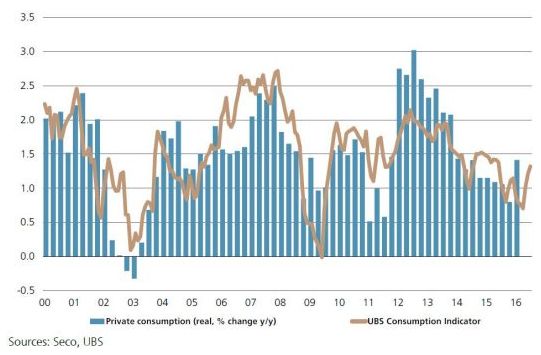The Swiss consumption indicator by UBS shows improvements. The indicator is still distant from the highs in 2012. At the time stronger growth in Emerging Markets and the weaker franc helped the Swiss economy.
In July, the UBS consumption indicator rose to 1.32 points from 1.21. A slight downward adjustment of the June figure and above-average car sales generated the increase. However, the disappointing June figures for tourism and sluggish consumer sentiment slightly curbed this upward trend.
Zurich, 31 August 2016 – The rise of the UBS consumption indicator to 1.32 from 1.21 still suggests a boost in Swiss private consumption, but is qualified by the downward adjustment of the June figure. The revision resulted from the much lower number of overnight hotel stays of Swiss guests in June than first projected. The dismal weather severely dampened the general desire to take a vacation, resulting in a 3.3% reduction in overnight stays compared to the previous year. Car sales, on the other hand, performed very well. The number of registrations of new motor vehicles in July was higher than the corresponding monthly average since the start of the new millennium. Car buyers, it appears, have switched from the accelerator to cruise control after the extraordinary levels of activity in 2015 – sustained by the strength of the franc and the resulting price cuts by importers.
Private consumption vs. UBS Consumption IndicatorFollowing the UK’s vote to leave the EU, UBS economists marginally lowered their prognosis for Swiss economic growth in 2016 to 0.9%. They are also slightly more pessimistic regarding 2017, with a new prognosis of 1.3%; this is due to the fact that growth prospects in the Eurozone have deteriorated slightly, which will probably constrain the local export industry here. The fact that the Brexit decision has only had a mild effect on the Swiss economy so far is partly due to the stability of private consumption here. The UBS consumption indicator in July indicates that private consumption will still be a strong pillar of growth over the rest of the year. |
Switzerland Private Consumption and UBS Consumption Indicator |
How the UBS Consumption Indicator is calculated
The UBS Consumption Indicator signals private consumption trends in Switzerland with a lead time of one to three months on the official figures. At more than 50%, private consumption is by far the most important component of Swiss GDP. UBS calculates this leading indicator from six consumer-related parameters: new car registrations, business activity in the retail sector, the number of domestic overnight hotel stays by Swiss residents, the consumer sentiment index, employment figures and credit card transactions made via UBS at points of sale in Switzerland. With the exception of the consumer sentiment index and employment figures, all of this data is available monthly.
Are you the author? Previous post See more for Next post
Tags: newslettersent,Switzerland Private Consumption,Switzerland UBS Consumption Indicator,U.S. Consumer Spending








































